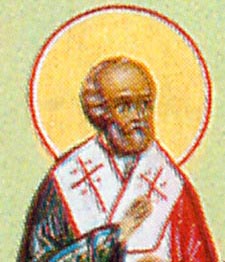|
|||
|---|---|---|---|
| This weekly bulletin insert complements the curriculum published by the Department of Christian Education of the Orthodox Church in America. This and many other Christian Education resources are available at http://dce.oca.org. | |||

The Apostle Quadratus was one of the Seventy. Like the other apostles, he went out to preach as Christ had directed. His work in Thessaly (central Greece) and Athens brought many pagans to faith in Jesus Christ. But his success aroused the anger of those who hated or feared the Gospel message. He was stoned by an enraged mob, and when they couldn't kill him, they had him thrown into prison. There he died of starvation. What would make Quadratus and the other apostles willing to preach a message they knew was so personally dangerous? What had they seen in Christ, heard from Him, believed because of Him, that gave them the courage to do what they did? Quadratus gives us the answer himself. He was preaching about what he knew to be true, as he writes in his Apologia or Defense of the Faith: "They [referring to people healed or raised from the dead by Christ] lived not only during the existence of the Savior upon the earth, but they also remained alive long after His departure. Some, indeed, have survived to our own time." Knowing Christ to be the Savior who raised and healed, he was compelled to share the Good News with the world. This witness to Christ by someone of His own time is the reason we should not be taken in by books of our time that try to "remake" Christ into something He was not. One such popular book is "Zealot: The Life and Times of Jesus of Nazareth" by Reza Aslan. Aslan's claim is that Jesus was a revolutionary—a zealot—who wanted to drive the Romans from Palestine and then make himself king, in the purely worldly sense of that word. Jesus was crucified, Aslan says, because he was a violent threat to the peace of the Roman Empire. Right there is one of the problems with the ideas of this writer who's been called a "religious scholar." According to Aslan, crucifixion was used to punish political criminals exclusively. But anyone who's seen the movie "Spartacus" knows that slaves were crucified. Any reader of the New Testament account of Jesus' crucifixion knows that robbers were, too. Aslan really doesn't seem to know the New Testament very well. He blithely dismisses (or is ignorant of) Mark 14: 28 and 16: 6 when he writes that the Gospel of Mark says "nothing at all about Jesus' resurrection." And a "scholar" should know better than to write that Paul's letters make up "the bulk of the New Testament" when, in fact, the Gospels constitute three-quarters of it.
Aslan depicts Jesus as a failed revolutionary, and claims that only in later years did Christians such as Paul, longing for a savior, turn this violent zealot into a non-violent messiah. Reza Aslan would do well to become acquainted with such figures as Quadratus and then ask himself whether that apostle, or indeed any of the martyrs through the centuries, would have been willing to die for the Jesus he has imagined. |
|||
